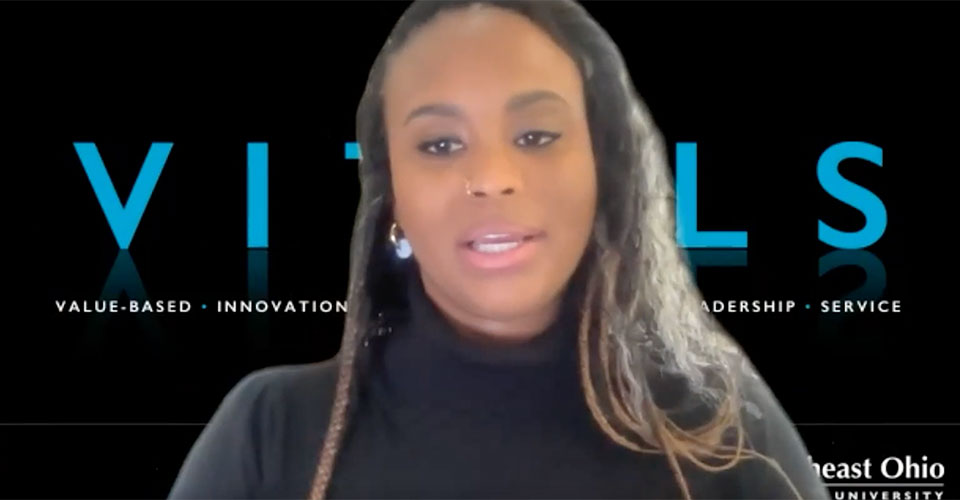Yoleetah Ilodi, M.D., FACP, who recently completed a two-year term as NEOMED’s assistant dean of diversity in the College of Medicine, joined VITALS on Thursday, Feb. 2.
Dr. Ilodi also practices internal medicine and geriatrics for Summa Health, where she is the lead physician for diversity, inclusion and recruitment for medical education.
During her VITALS presentation, she discussed health care equity and social determinants of health, sharing both personal and practice illustrations.
“My goal is to cultivate equitable health outcomes. And that's really one of the reasons why I went into [medical education],” Dr. Ilodi said. “Not just to integrate, but to infuse justice into undergraduate and graduate and continuing medical education spaces. We want to dismantle policies that perpetuate inequities, and we want to connect with all of our stakeholders to properly address issues.”
Dr. Ilodi noted the importance of communication and credited her family for teaching her the “power of community in connection.”
“I have tried to make sure I connect with people, to see how I can support them,” she said. “But they also taught me the meaning of service and looking at the whole person… not just as a physician, but as someone talking form a human to another human.”
Communication is not a one-way street. While talking to share information is important, it’s equally important to listen. Dr. Ilodi noted that sometimes it’s difficult to determine the root cause of someone’s ailment just from medical tests.
“You’ve got to be able to connect with your patient, to be able to get that piece of information out of the patient,” she said, citing the case of a 47-year-old female identifying person who goes into the doctor’s office and has unexplained weight loss. After labs and other tests reveal no medical issues, a discussion with the patient fills in the blanks – she was missing work to care for her father, who has dementia, and did not have enough money to buy adequate food.
“We call these social determinants of health, but there's not just a checklist. All of these things are interconnected to each other and they play a huge role with each other,” Dr. Ilodi said. “And it's not just health. If you're not healthy, how are you going to school? If you can't go to school, how can you go to work? It's important that we understand how all of these things work into each other and that these cause disparities in health.”
So what else can be done to address health disparities?
“We start to work on what we can do better for our patients, to connect with them as an organization, to integrate, to increase our diversity, to infuse justice seamlessly into our curriculum. This will show us that we all can do better,” Dr. Ilodi said.
A Q&A, moderated by WKYC senior health correspondent Monica Robins, followed Dr. Ilodi’s remarks.
Watch VITALS with Dr. Yoleetah Ilodi
Sign up for next VITALS program with Frank Beck, D.D.S., FAAHD, interim inaugural dean, Bitonte College of Dentistry and adjunct professor of internal medicine.
